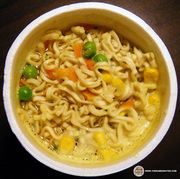
One of the latest research published in the Journal of nutrition found the many of the instant noodles along with Ramen may put the person at risk of developing cardiometabolic syndrome, which is an indication for severe heart diseases and stroke, particularly in women. A lead researcher, named Hyun Joon Shin, MD, said in a press release that this study is of high importance since a lot of individuals eat instant noodles without being aware of its risks for health.
What’s The Study?
To conduct the study, researchers took into account the details of more than ten-thousand adults who were between the ages of 19 and 64. These details were collected through the nationally representative Korean National Health and Nutrition Examination Survey of 2007-2009.
Researchers found that people who consume instant noodles such as glass, Ramen, lo mein, Thai, or other at least two or three times a day are linked to cardiometabolic syndrome. This syndrome involves a segregation of anomalies that affects the body’s metabolic, renal and cardiovascular systems.
The real cause of the issue is still not found; however, Shin, a clinical cardiology fellow at Baylor University Medical Center found that the concern may arise from the fact that most instant noodles meals come in packs of Styrofoam. It is material that is composed of bisphenol A (BPA), which is a known hormone disruptor. This is why women are found to be highly affected in this research. Moreover, the food product is also composed of abundant harmful and healthy constituents such as MSG, tertiary-butylhydroquinone (TBHQ- a chemical preservative) and saturated fat.
The research was conducted on residents in South Korea since the country has the largest number of population that consume instant noodles as compared to the rest of the world. Moreover, in the past few years, health disorders such as obesity and cardiovascular diseases have been on the rise in South Korea.
However, the findings of the study were also found to be very relevant in the United States, which is ranked sixth in the world for instant noodles sales. The World Instant Noodles Association has found more than four-thousand billion units of instant noodles sold in the year 2013 in the United States alone. Other countries that are leaders in instant noodles sales are China, Indonesia, Japan, Vietnam, and India.
Ramen noodles have garnered a bad reputation earlier, as well. A video was made available in the year 2012, which was taken from inside the digestive tract and it displayed what happens to the body after consuming instant noodles. This was part of a small study done by Dr. Braden Kuo. Your stomach works hard to digest the strands of noodles because of the presence of a petroleum by-product, THBQ. Moreover, a few years back, Malaysian health officials warned of the risks of consuming instant noodles because of the ingredients contained such as stabilizers, preservatives, sodium, and thickeners. All of these ingredients are known to cause diseases such as kidney damage, stroke and cardiovascular disease.
When questioned from Nissin Foods, who created the first instant Ramen noodle in Japan in the year 1958 and then brought Top Ramen, the authorities were not available to answer these concerns.
So, what’s the conclusion of the research? Consume cheap and instant noodles at your own risk.
© 2014 Divine Health, Inc., All rights reserved.
__________________________
Coach's Comments: Even the media is giving adults and children the wrong message! Have you seen the Allstate Insurance commercial: This commercial starts out with, "[Girl's name] is just starting out and on a budget, like a ramen noodle every night budget…"
I worked in an office for ten years. The owner of the business ate ramen noodles daily for lunch because it was cheap. She probably got cases of them from a dollar store and also fed them to her kids.
Putting your food budget at the "bottom" of the list will surely cause a health disaster for you and for your family. Foods that are cheap contain non-food additives that will put you and your family at risk. Put your food budget toward the top of that list and put a few dollars a week in your piggy bank. Your "stash" will add up and you can take a vacation rather than spending it on medicines to manage illnesses caused by poor nutrition.
 RSS Feed
RSS Feed